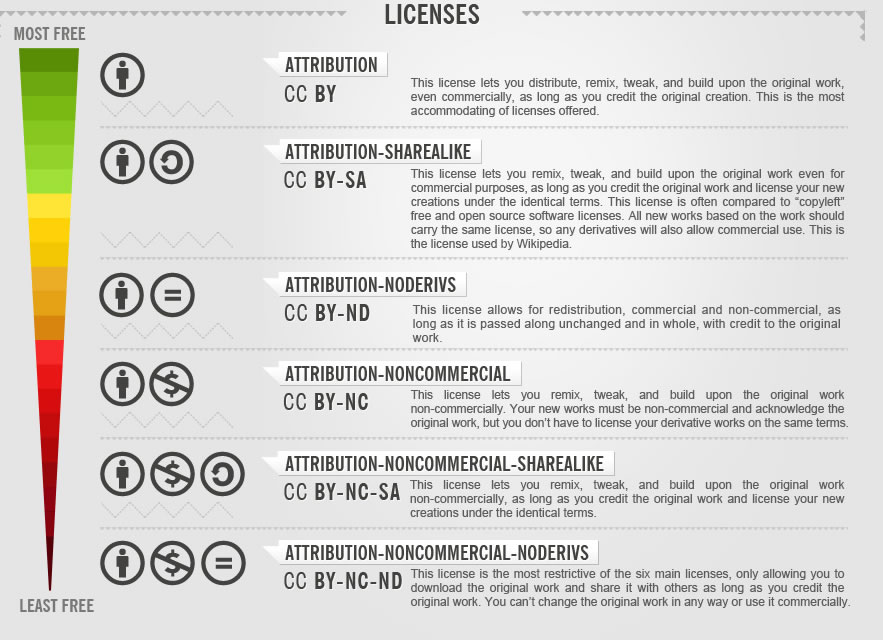What is it?
Creative Commons is a nonprofit organization that enables the sharing and use of creativity and knowledge through free legal tools.
“The free, easy-to-use copyright licenses provide a simple, standardized way to give the public permission to share and use your creative work — on conditions of your choice. CC licenses let you easily change your copyright terms from the default of ‘all rights reserved’ to ‘some rights reserved’.
Creative Commons licenses are not an alternative to copyright. They work alongside copyright and enable you to modify your copyright terms to best suit your needs.
Creative Commons offers licenses and tools to the public free of charge and does not require that creators or other rights holders register with CC in order to apply a CC license to a work. This means that CC does not have special knowledge of who uses the licenses and for what purposes, nor does CC have a way to contact creators beyond means generally available to the public. CC has no authority to grant permission on behalf of those persons, nor does CC manage those rights on behalf of others.
If you would like to obtain additional permissions to use the work beyond those granted by the license that has been applied, or if you’re not sure if your intended use is permitted by the license, you should contact the rights holder.” (Creative Commons 2014)
Why do we need it?
New ways of publishing on the internet require different licensing arrangements, so that work can be freely shared and reconfigured to advance research. Creative Commons allows this flexibility.
- Creators can retain their copyright and allow specified re-use depending on the licence chosen.
- Users can see immediately what they are allowed to do with a work without the time-consuming need to contact the author for permission.
How does this work?


Source: http://foter.com/blog/files/2012/11/Foter.com_infographic_CC.jpg
How do I use it in my own work?
Where the RCUK OA block grant is used to pay Article Processing Charges for a paper, the paper must be made Open Access immediately at the time of on-line publication, using the Creative Commons Attribution (CC BY) licence. Find out more in the RCUK OA Policy.
For all other material: Use the Creative Commons tool to choose your licence.
How do I use it with other people’s work?
When you come across work that uses Creative Commons you will see the distinctive Creative Commons logo (as below) and there will be a link to the licence under which it has been released. This tells you exactly what you are allowed to do with it.
Finding Creative Commons works
The Creative Commons website has a search engine that searches the Web for Creative Commons works, and Google (under its Advanced Search facility) has an option to search for materials that use Creative Commons. Select usage rights and from drop down menu: free to share or modify, even commercially.











 Fourth INRC Symposium: From Clinical Applications to Neuro-Inspired Computation
Fourth INRC Symposium: From Clinical Applications to Neuro-Inspired Computation Writing policy briefs
Writing policy briefs Upholding Excellence: The Concordat to Support Research Integrity
Upholding Excellence: The Concordat to Support Research Integrity Today’s Documentation Will Serve Tomorrow’s Justice
Today’s Documentation Will Serve Tomorrow’s Justice ECR Funding Open Call: Research Culture & Community Grant – Application Deadline Friday 12 December
ECR Funding Open Call: Research Culture & Community Grant – Application Deadline Friday 12 December MSCA Postdoctoral Fellowships 2025 Call
MSCA Postdoctoral Fellowships 2025 Call ERC Advanced Grant 2025 Webinar
ERC Advanced Grant 2025 Webinar Horizon Europe Work Programme 2025 Published
Horizon Europe Work Programme 2025 Published Horizon Europe 2025 Work Programme pre-Published
Horizon Europe 2025 Work Programme pre-Published Update on UKRO services
Update on UKRO services European research project exploring use of ‘virtual twins’ to better manage metabolic associated fatty liver disease
European research project exploring use of ‘virtual twins’ to better manage metabolic associated fatty liver disease